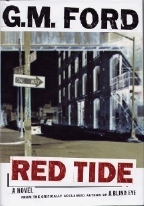Red Tide
G.M. Ford
William Morrow/Harper Collins
US Hardcover First
ISBN: 0-06-055480-0
313 Pages; $23.95
Publication Date: June, 2004
Date Reviewed: June 21, 2004
Reviewed by: Terry D'Auray © 2004

REFERENCES
COLUMNS
|
|
|
Red TideG.M. FordWilliam Morrow/Harper CollinsUS Hardcover FirstISBN: 0-06-055480-0313 Pages; $23.95Publication Date: June, 2004Date Reviewed: June 21, 2004Reviewed by: Terry D'Auray © 2004 |

|
|
REFERENCES |
COLUMNS |
G.M. Ford introduced defrocked reporter Frank Corso in 2001 with the under-read but widely acclaimed 'Fury', followed by 'Black River' and 'Blind Eye'. In 'Red Tide', Corso's back, furious and black-humored as ever, facing and foiling a bioterrorist threat set off under the streets of Seattle. And as is Ford's predilection in this gritty series, it's not always easy to distinguish the good guys from the bad ones, moral high roads are scarce and corruption and greed define the landscape.
'Red Tide' opens with a brief, but ominous, phone conversation among characters yet-to-be-revealed, followed immediately by a truly grizzly and shockingly graphic scene of bioterror in a Seattle bus tunnel. Ford quickly moves the story to a seemingly benign art gallery soiree showcasing Meg Dougherty's photographs with Frank Corso a reluctant attendee. It's a move that both sets up the multiple threads of the story and gives the reader a chance to regain his balance after the intensity of the preceding events.
Dougherty is Corso's sidekick and love-interest, a tough-on-the-outside, vulnerable-on-the inside Goth girl, tattooed from head to toe and left to die by an insane ex boyfriend. She is a strongly-written recurring character in Ford's series, sometimes given almost equal time, other times, as here, given a less dominant role. Driven from the gallery by an unexplained police evacuation, Corso and Dougherty split up; Corso to pursue the bioterrorist thread, Meg to pursue a confrontation with her ex.
In 'Red Tide', Ford showcases the masterful plotting that marks the other works in this series and, were that all the book had to offer, it could be described as a taut, edge-of-your-seat thriller. But Ford amps-up the typical thriller with well-drawn characters, crisp and biting prose, and a chilling political indictment. Without losing a beat in the page-turning plot, Ford turns the mirror toward contemporary American society and finds corruption, hatred, greed and stupidity in every corner. He skewers the FBI, the CIA, the Department of Homeland Security, the press and the Patriot Act. He nails self-serving politicians, avaricious corporations, ambitious reporters and empire-building government agencies with dialogue that is sharp and cynically funny and descriptions that are equally so.
In 'Red Tide', Ford reprieves several beat-walking cops and the Chief of Police from previous novels, and, in a break from convention, lets them, not Corso, propel most of the action. If there are any heroes in this narrative, it is these few police officers, dogged, smart and fundamentally upright in a world quite clearly off its moral kilter. Corso, surly and enigmatic as ever, stands aside, bringing his own cynical and ultimately accurate perspective to bear on resolving the crime. As in 'Black River', Ford structures his narrative to weave the law enforcement perspective with that of the perpetrators. The effect is a dimensioned and compelling telling of the story from both sides of the table and a commensurate intensity and moral ambiguity that is dark and disturbing.
'Red Tide's bioterrorist plot is uniquely executed and unexpected. While the threat is realistically portrayed, often in unsettling physical detail, the perpetrators and underlying rationale are not rooted, as you would anticipate, in the middle east, not rooted in religious zeal, nor in quests for domination. The underpinnings, instead, are rooted in human suffering and the natural human search for revenge. The bad guys are amateurs seeking retribution for past atrocities committed by the truly bad guys, arrogant and greedy American corporations. There is a seething and visceral anger underlying this narrative, articulated by the terrorists and echoed by Corso himself, that makes it especially chilling and especially courageous. While some readers may find the politics heavy-handed, the novel excels because Ford attacks these political issues with a sledge hammer leaving no doubt about his assessment of the contemporary landscape. If you agree with his views, you'll be pissed off at the god awful state of our country's values. If you don't take to his perspective, you most certainly will find it understandable, impossible to ignore and ultimately, gripping.
There are no happy endings in Ford's Corso novels. While the story is brought to a satisfying conclusion, the survivors are disillusioned, scarred and fearful, while the institutions that truly bear the blame remain unchanged. You leave the book, at its end, entertained and educated, with a bleak view of our political climate, and a deep sadness for its sorry state.